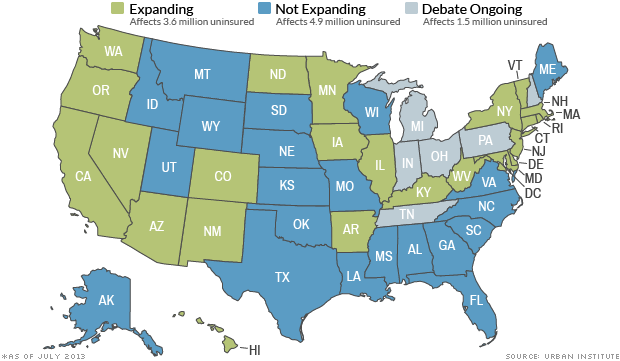Here is how Obamacare’s scope has narrowed in recent years:
Public option? Never mind.
President Obama once trumpeted the idea of providing a public option in health care, essentially a government-run plan that would be one of many choices for people seeking affordable care.
That idea, long opposed by conservatives and many moderates, never made it into Obamacare. In the quest for a workable compromise, the White House deemed it expendable.
Long-term care insurance? No such thing.
When Obama signed his healthcare plan into law, it included a proposal to provide basic long-term care insurance at an affordable cost. But before the program ever got off the ground, the administration ditched it last spring for fear it would turn into a financial drain. It could take years before lawmakers tackle the issue again.
Coverage for the neediest? Not in every state.
Obamacare envisioned millions of the neediest Americans gaining health insurance by enrolling in Medicaid, with coverage starting in January. But the Supreme Court threw a wrench in that plan last year when it gave states the right to opt out of the Medicaid expansion plan.
Because of Republican opposition in many states, it looks like nearly two in three of those who would qualify for new Medicaid coverage may be out of luck because their state lawmakers have not agreed to expand the program.
What about workers? A longer wait.
Obamacare requires companies with 50 or more workers to offer affordable coverage to full-time employees or risk escalating tax penalties. Originally, that requirement was supposed to take effect on Jan. 1. But now the administration is pushing that requirement back a year, citing the complexity of the undertaking.
Most medium and large businesses already offer health insurance. Those most likely to be affected by the delay: low-wage workers at hotels, restaurants and stores.
In addition, because the individual mandate remains in place, workers may now be forced to buy their own insurance or pay a penalty because their employers don’t provide coverage, according to the Cato Institute, a Washington-based public policy think tank.
The administration’s decision essentially shifts the cost from employers to workers. This hardly seems fair, the Cato Institute contends, and may force the White House to even rethink the individual mandate.Read the full story HERE.
If you like what you see, please "Like" us on Facebook either here or here.
Please follow us on Twitter here.
Please follow us on Twitter here.




No comments:
Post a Comment